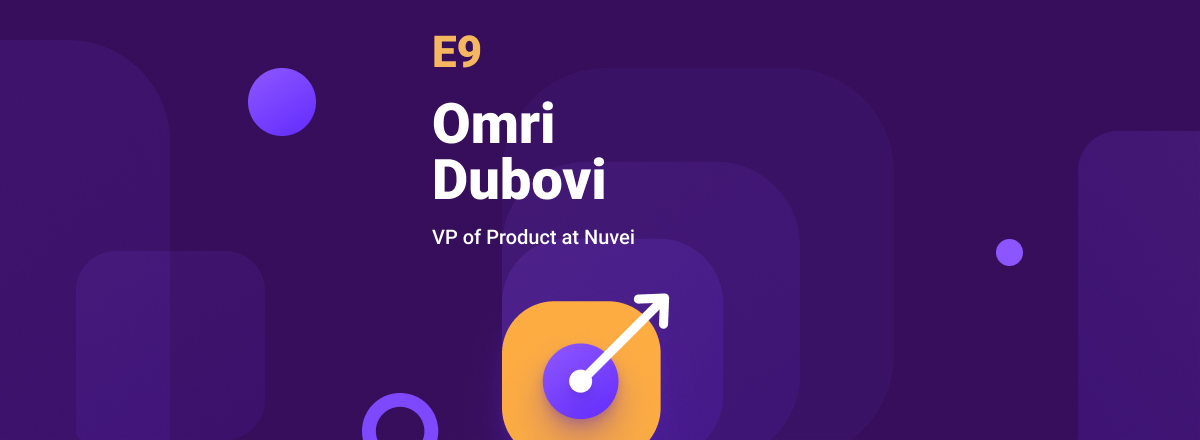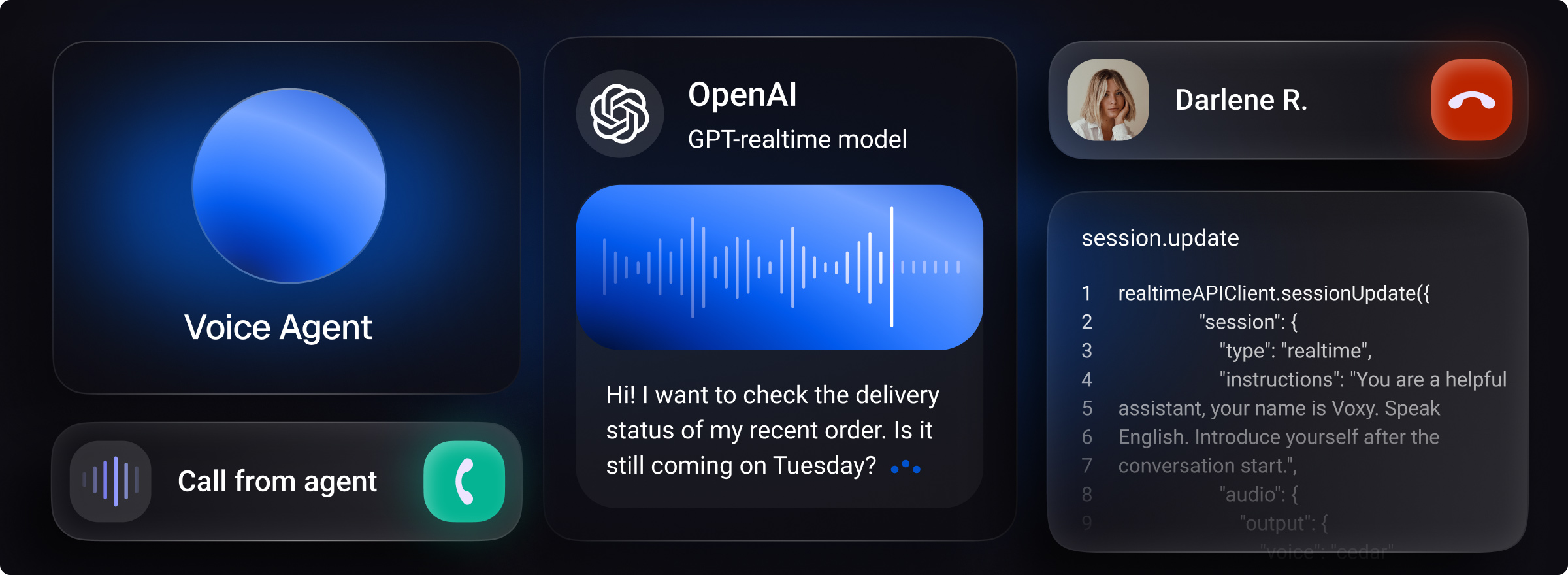We are eager to share the ninth episode of The Product Management Leaders Podcast with you! Our aim with this podcast is to connect you with some of the top PM leaders and share their real-world strategies and tactics for building world-class products. In today's episode, Grant Duncan speaks with Omri Dubovi, VP of Product at Nuvei, a publicly traded fintech company. He also brings an international perspective as he is currently based in Israel.
Listen to the episode here, or continue reading.
Grant Duncan 0:05
This is the Product Management Leaders Podcast in which you hear from some of the top PM leaders about their real world strategies and tactics for building world class products. It's sponsored by Voximplant, the leading serverless communications platform and no code drag and drop contact center solution. Voximplant enables product leaders and developers to integrate communications into their products, such as embedding voice, video, SMS, in app chat and natural language processing. Join over 30,000 businesses trusting Voximplant. Now let's jump into the show.
Hi, this is your host, Grant Duncan. Today's guest is Omri Dubovi, VP of Product at Nuvei, a publicly traded fintech company. He also brings an international perspective as he is currently based in Israel. Let's jump into the conversation.
Hey, Omri, it's great to have you on the show today, to start, can you share a little bit about your role and what the company does?
Omri Dubovi 1:08
So thank you very much for having me, happy to be here. We are in a way, we are global payment provider. Basically, we are enabling commerce to our merchants or our clients customers. We are the global payment provider, we practice payments, all sorts of payments B to B, B to B to C, and all over the world.
We are native acquired and acquiring wealth ourselves in many, many regions, especially in the European Union, and some want to be the UK Brexit entity, and also UK and Canada, US and Canada they will have our own acquire licenses. We are looking obviously at extending those. We are processing locally, more than 45 different markets and we serve around 450 different APS, all the entire system and platform is native and in house. So everything has been developed here and the proprietary is our proprietary, which I think makes us one of the only payment providers that can support globally, this amount of markets and also owns the technology. In addition, we are working with a lot of partners around 30 or 40. Today, already acquiring partners, that gives us coverage worldwide.
Grant Duncan 2:41
Very cool. That's great to hear. Can you share how your team is structured?
Omri Dubovi 2:45
Yeah. So in the product team, I'm managing a group of 20 people, while I'm having the head of product report directly to me. And the team is constructed out of few holistic teams. One of them is the product risk and back office. Well, they actually practice all of our risk methods reporting and data requirements. The other one is bread and butter of acquiring. Well, most of our business is coming from so this is another product group that reports directly to me, they're taking care of all our acquiring and gateway activities worldwide. And next one is the financing bidding, obviously, crucial fundamental of our work, how to properly build transaction and run the corresponding financial processes associated with those transactions. I also have a team of CLM and interfaces and responsible to all of the channels of how to do business with us.
So the sets of API's and then plugins and CRM processes. All of this is consolidated into one very, very thoughtful team. And we have our friends from all over the world from Romania to Europe, Israel, and obviously also North America, US and Canada. Mostly doing integration well. You know, we are acquiring lots of businesses eventually. So integrating all this work into one functioning entity or merging this business into our core, a core offering. This is another very important tool that lies with the product.
Grant Duncan 4:57
That's awesome. That's a big team. Is your team, I think you were mentioning this, how do you deal with people in different locations, especially in this hybrid work environment we're in today.
Omri Dubovi 5:10
So I think, obviously, you know, language was never a barrier. But also timezone is not a barrier. And I think what we have succeeded to do is to formulate a team that even though spread around the world, we are all talking the same language. And we are all doing adjustments either in our schedule, and not less important in our terminology. So how do we this is obviously one of the challenges. How do we bring everyone to unify terminology of products, of solutions, of value proposition. And once we have achieved that, so you know, juggling between different time zones, this is the easy part. And we have everyone like working shoulder to shoulder. And also on the practical level, I personally believe that 50% of the problem can be solved within a chat. So one chat is better than 100 emails. And I really believe that chatting, in group chatting, individual chatting, whatever immediate communication can solve a lot of problem in a reasonable time.
Grant Duncan 6:25
Very cool. Yeah, that's great.
Omri Dubovi 6:28
So there's always the practical and then the conceptual.
Grant Duncan 6:32
Yeah, yeah, totally. And can you share about one of the hardest product decisions you've had to make?
Omri Dubovi 6:41
I think that every product manager will tell you that the hardest decision is always about product termination. It's not about decision of how to implement something, or how to go and build something out from scratch, or whether to integrate to a service or not, it's about something that is already there in the market. And you see that it's not performing and come up to the decision. Okay, this is something that we need to terminate. And we have been, we have made for this process in the past year, obviously COVID has had its impact, as well, although we are performing very well, in the last year and a half since COVID started. So you know, it gave a great boost to ecommerce. But there was surveys, I cannot really get into details, but there was one of our services that was not adaptive enough to this new environment. And we kind of needed to take a decision. Okay, we are not going to invest more effort or more money, or, more development time on this service. And I think this was obviously something hard for me, because you know, as a product manager, you kind of get emotionally attached to the product that you send out to the market. And, you know, a meeting that something is not working as expected. And I think this is a problem.
Grant Duncan 8:16
Yeah. And have you had to do that in the past as well? Or was this more recent experience?
Omri Dubovi 8:24
It's a recent experience I had experience like that in the past as well. But it's not common. It's not like every quarter we are with the commission, one or two services that are totally the opposite. So we are bringing content to market and we are trying to do the most efficient and professional cost benefit analysis and market research before pushing something to the market. But sometimes, you know...
Grant Duncan 8:56
Yeah, yeah, of course. And how do you balance important requests from let's say, multimillion dollar customers, with your existing roadmap when maybe they aren't aligned?
Omri Dubovi 9:08
So I think the secret is to leave room in your roadmap to client requirements. And when it comes to balancing a road map, you should always look about three main verticals. One is how can I keep the business going? The second one is how can I let the business go? And the third one is what changes do I need to perform in the platform in order for the technology to serve better the business but not the other way around? So the technology itself is to sell the business and not business itself the technology but when getting back to the first two, I think that keep the business going. Those are all the client requirements those multimillion dollar that comes out of nowhere and you need to cope with.
And the other one is how do you let the business go? What kind of products you push to the market from an innovation and flexible perspective? How do you increase your market share? And also, how do you expand geographically, which is super important in our business. So I think that balancing those three, both from an operational perspective, but also from a business perspective is very important. And you know, on the other side, I think we are all as product managers exposed to the fact that there will be current requirements that are out there, and we need to cope with them. So sometimes you need maybe to push a project or a product by a month or two. And those, those kinds of things happen. Because eventually money talks.
But I think that our role is how to balance those things, and how to be flexible enough, especially when we are working in an agile environment, to balance between new development and existing clients that needs new features. And always when I have a new feature, and that will be my last sentence on the subject. When you have these kinds of new comments from clients, you need to understand whether it's something which is applicable to a subset of clients that, you know, maybe it has its economic justification, or it's something which is specific and tailor made for one client, which has no impact on your portfolio. And those obviously get different understanding.
Grant Duncan 11:38
Yeah, that's interesting to have those three buckets, I like that framework. How do you think about technical debt? Does that go in that third bucket? Or do you kind of mix them?
Omri Dubovi 11:50
That goes into the third bucket, you know, as an independent item. But each one of the product that we are developing for all day, whether it's client related or roadmap, let's say, related, will always have technical challenges and technical enhancements that you need to introduce in order to bring this scale to the market. It's either new technology or leveraging existing technology. For better or more optimal usage?
Grant Duncan 12:21
Sure. What does the pie chart have a normal day or week look like for you?
Omri Dubovi 12:28
So I'm the kind of into the details guy. Now even though I'm managing quite a big team. I like to know what my people are doing. So I'm talking to each one of the culprits at least once a week, to identify if there are any challenge or once a day, sorry not once a week, to identify any challenges, concerns, or issues that we need to resolve. A lot of my day is spent around the future acquisitions. So we acquire a lot of businesses and expand our business globally. So we participate in many diligence calls, in order to assess the quality. And to identify this product can serve our value proposition.
And then there is always a balance between product strategy, how do we bring in new things to the market and product innovation and our day to day, which can be partially operational, and partially support for products that are already out there that needs enhancements? So some changes. So it's, you know, it's hard for me to come up with the exact number, but I would say that the one fold of it is supporting the team. And the other third is more around strategy and another acquire new businesses. And the other third is what I would say down dwells dealing with operational staff existing products and the day to day management of the team.
Grant Duncan 14:12
That's helpful to hear. And how do you have any tips for people for how to work effectively with engineering teams?
Omri Dubovi 14:20
Yeah, so I think with engineering the key word is about communication. Because you need to link the engineers and the development to what you're trying to achieve. Okay, so my first tip will be once you formalize your roadmap, make sure you share it with the developers and then the IT teams so they would know what to expect and also explain to them what the business value of what they are doing. And it's at least to demand the standing that that is the truth before developing a product but also after developing a product. So if there are some good results, don't be shy. And then share it with the engineering team.
Also make sure the engineering team at least the heads of the engineering team are flexible enough and are open to changes. And work together with them hand by hand when recognizing and identifying requirements. So you know, the engineering and the development, they will always probably complain that the requirement was not well enough defined. And I think this is something that at least in an agile environment, can be solved by better and closer communication. And don't miss your daily calls. The most important stuff is going on the daily calls, and I find those very, very effective.
Grant Duncan 15:45
Yeah, yeah, that's great advice. How do you think about customer engagement and communication in your products?
Omri Dubovi 15:52
Yeah, so first of all, I'm a true believer in communication with clients. So as this product, in many cases, we need to put on the outfit of the solution architect. So we are not only product managers who need not only to develop kickass products, but also to know how to sell them. And this, again, divides into two. For one point of view, that is the last mile of the product, how we as product managers, and product owners run with the product, not only until it's ready for the market, but also how do we prepare the materials to tell the proper documentation for the salespeople to sell it. And how we come up in front of the clients and actually sell for them.
So we need to have a strong enough pitch in order for the client to understand what are the benefits of the product. And I think that at least the first few calls when introducing a new product or new functionality to the market, the product manager must be there. In addition, participating in QBR. This for me, this is something very important to get the direct feedback from the field, about the product and about the feature functionality that we have introduced, and how they are consulted or interpolated by the audience, by our clients.
Grant Duncan 17:21
Yeah, I love that you even joined the QBRs. That's really nice.
Omri Dubovi 17:25
Not all of them, but from time to time I do occasionally some strategic clients even traveling when possible.
Grant Duncan 17:33
Sure. I'm sure that helps you gain a level of trust with your internal teams that helps as well. That's great.
Omri Dubovi 17:42
For sure, because you know, you asked about the tips about working with the IT and R&D teams, but I think it's also applicable for the commercial teams. Because essentially, we as product manager with deliver content to the organization, and the consumer of this content are the sales and commercial things. So we need to have at least the same level of relationship with them like we have with the CR. And then IT, you think about it, like a spectrum. So for one hand, on one side, you have the information technology go but on the other hand, you have the business and commercial team and us as product managers who are kind of sitting in the middle need to interpret requirements from one side to another.
Grant Duncan 18:35
Yeah, yeah, that's great. And you talked earlier about evaluating many companies to potentially acquire, how do you think about a build versus a buy decision? Like you build it internally, yourself? Or you either buy a company or buy some company's product?
Omri Dubovi 18:57
So usually, it comes up to the iron triangle of project management, right? So it's the content, it's the cost, and it's the quality and then the timeline of course. So, the question is, what are your strategic goals? We for example, as an organization, we have fully started up now the first one is goal our market globally. The second one is being innovative and flexible, and the other one is being secure and reliable as a payment provider. So we are always looking for companies and businesses that can cater for those three pillars.
So I think that in many cases, most of them are more on the strategic product management level. We are taking the decision based on obviously the cost and also the timeline how fast if we build something else? How fast can we can we get it to market and mean what cost? Whether, should we buy this business? And downside to that, you need to acknowledge that we are a public company now. The Toronto Stock Exchange, and each one of those acquisitions usually impact our stock. So this is also something maybe not directly related to the product management team and the product due diligence. But this is also a very important vertical decision criteria, whether to acquire or not the business.
Grant Duncan 20:33
Yeah. Yeah, that makes a lot of sense. Are there other things that you have to keep in mind being a public company that others might not be aware of?
Omri Dubovi 20:42
You know, eventually? What can we do? And this is the magic, I think of being a public company, what you're doing as product and as a delivery organization impacts the bottom line, and it's amazing to see and hear our CEO, talking in those investor calls about feature functionality sets that you have been working on, and few minutes after you see the the stock rising by 10%. So I think this is kind of what fulfillment looks like.
Grant Duncan 21:18
Yeah, but that's a great surge of energy when you see that.
Omri Dubovi 21:21
For sure.
Grant Duncan 21:22
So I guess, you know, maybe the flip side to that is, what do you recommend PMs do to deal with failure?
Omri Dubovi 21:29
First of all, embrace the failure. Okay, we all fail. The question is, what's the frequency? And, you know, it's maybe a cliche, but what can we learn from this failure? And I think we need to do some kind of research post failure to understand what have we done wrong? And it usually will be in the pre analysis, I would say is important, have we not analyzed, we need to ask ourselves, if we have not analyzed the market correctly. Or what have we missed while benchmarking this product, or what we expected to deliver with the actual needs of the market? So all of those questions should devise. And maybe what we need to ask ourselves is, have we properly defined the KPIs of the product and this entire process of developing, solely identifying and defining the KPIs of, of the product pre development, I think has a great impact whether the product is considered successful.
Grant Duncan 22:37
And what keeps you up at night?
Omri Dubovi 22:39
My kids.
Grant Duncan 22:44
I can imagine so.
Omri Dubovi 22:47
That was the easiest one so far.
Grant Duncan 22:52
I'm sure there are many people who resonate with you on that one. Are there any sources or communities or thought leaders that you like to follow that others might want to check out?
Omri Dubovi 23:04
So I consume a lot of content from LinkedIn, around payment and around FinTech in general, and also about product management. In Israel, we have a WhatsApp group of what we call the VPP, a group of VP products in Israel and a lot of nice content there. But I would like to, I'm reading before my bedtime, I mostly invest my time in two areas. One is around product management. And the other one is around the payment industry, and FinTech in general, what are the trends in FinTech? What are the new and innovative products that were recently launched in the payment industry? And how those are related to the great payment industry?
Grant Duncan 23:59
Yeah, that makes a lot of sense. And if I give you a magic wand, and you had one wish to solve any product management problem, what would that be?
Omri Dubovi 24:09
Optimizing, probably optimizing how we work with, with the R&D team, and you know, for the benefits or how to identify and how to modify requirements, product requirements in a way that will be for one hand, very coherent to developments, but to developers, but on the other hand, very, you know, adaptive to what the business needs. How to do this metric calculation of requirements between the business and what we actually want to bring to the market.
Grant Duncan 24:50
Yeah, that's a good one. I've been a lot of people resonate with that. How do you explain to your family or let's say non-technical people, what you do for your job?
Omri Dubovi 25:00
Usually I tell them that, you know, people asking me so well, will you be in 10 years? So I'll eliminate baldness. So this is usually what I tell them that trying, trying to grow hair. Right now, seriously speaking, I like this distinction that we as product managers sit in the middle between the IT and R&D and the business. So we translate business requirements and business needs into deliverables and execution, that will be the sentence.
Grant Duncan 25:39
Okay, cool. That's a good sentence. And are there any tools that you're using and really loving these days?
Omri Dubovi 25:51
So our Vizio savvy, I need to admit, I always, you know, I always tell my friend, dear Sandy the Vizio Picasso. I really like shouting, you know, I'm working with some of the tools out there with some of the bolts and I have my notes, very organized. I'm still been an oddball guy. But I really believe in drawing, you know, drawing on the walls, drawing on the computer, or drawing, or whatever it is, I think that when drawing something, especially business processes and complex business processes that involve technology, use a better understanding and a better picture to everyone involved into all the stakeholders.
And try to keep it simple. That's the short, short and simple. We have a statement here in the office that any email, which is about five rows, the call the phone call, I've found I've held something very, very nice that you know, that is the coefficient for a pandemic spread. They know now so there is an M, how many meetings, each meeting generates. And it should be less than one. So we're trying to keep track of this one.
Grant Duncan 27:18
That's a good one.
Omri Dubovi 27:20
A meeting that generates another meeting, that's not a good thing. And it's you try to make sure that your meetings will be around the execution and clear the finishing of what needs to be done and not about what should be the next meeting?
Grant Duncan 27:35
Yeah, yeah, that makes a lot of sense. Sometimes, it feels like some people can do death by meetings. And so keeping that factor low is good. And could you just briefly share with people how you got to where you are today, I think sometimes it's helpful for up and coming leaders to hear the journeys of others.
Omri Dubovi 28:01
Sure, so um, you know, like any Israeli, as I served, the army, I did almost five years. And my position in the army was semi product management. And that involves also managing people. So this is what kind of gave me all showed me the way that this is something that I like to do. And then I've studied information engineering, in the university, and started to be honest, my professional journey outside of the army as a BI and data developer, then I moved to system analyst position and one team of system analyst and then the movement to product all was somewhat mature.
I truly believe that the best way to be a good product manager is to be able to for one hand to understand the system. And that's, I think, a recurring motive in our conversation, to understand the system and to understand the business. So having the ability to analyze a system in a professional way, and to adapt it to what the business needs. I think this is all the secretive. So I moved to the product position when I was in charge for the core business of the company that was another company but also the core technology implementation. And then they just move the move along the ladder and here I am today.
Grant Duncan 29:38
Very cool. That's great to hear. Awesome. Last question for you. Here. Is there anyone else? one other person maybe that you think we should have on the podcast?
Omri Dubovi 29:49
For sure there is. I have one member in my team. His name is Avi. That I think you will very much enjoy hearing from him and his insights around the product management in the entertainment industry. I can hook you up with him and he's a very intelligent guy and you will have a good time talking to him.
Grant Duncan 30:16
Well thanks so much for coming on today, really appreciate the great insights.
Omri Dubovi 30:20
Awesome. Thank you very much.
Grant Duncan 30:25
Thanks for listening to today's podcast, and thanks to our sponsor, Voximplant as well. If you're looking into how to improve your communication and customer engagement, check them out. Lastly, if you enjoyed this episode, please leave us a review and tell your friends, so that others can find it more easily. Have a great day. And feel free to reach out to me, Grant Duncan, if you have any questions you want asked in our next episode.





